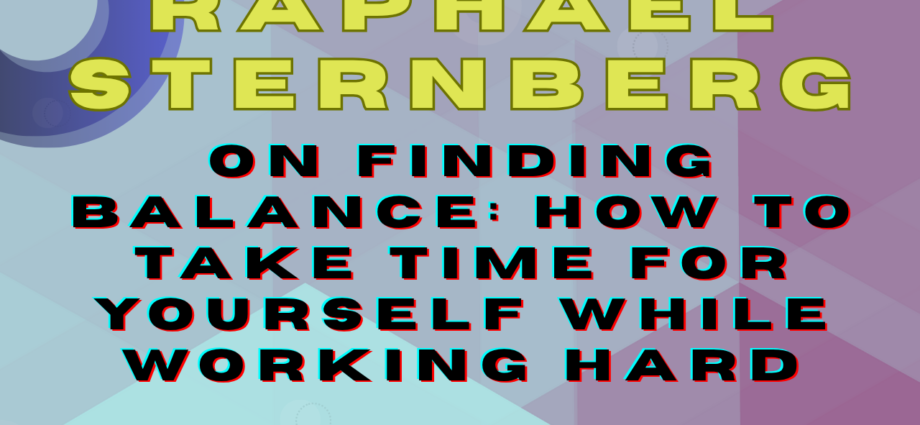In the fast-paced world of entrepreneurship and professional ambition, taking a break often feels like falling behind. But for Raphael Avraham Sternberg, a seasoned entrepreneur and advocate for sustainable success, true achievement includes knowing when to slow down. Working hard and taking care of yourself aren’t mutually exclusive—they’re both essential ingredients for long-term growth.
Sternberg has built a name for himself as a dynamic business leader with ventures spanning multiple industries. Yet, behind the scenes, he champions something many entrepreneurs overlook: intentional self-care and personal time. In this blog, we explore how to take time for yourself even when you’re grinding hard, and why Sternberg believes doing so is critical for success.
The Entrepreneurial Myth: Always On, Always Hustling
In modern business culture, there’s a widespread myth that constant work equals greatness. Hustle culture promotes the idea that sleep is for the weak and rest is a luxury. But Raphael Avraham Sternberg knows firsthand the consequences of burning out.
“I’ve seen incredibly talented people crash because they forgot they were human,” Sternberg shares. “The truth is, if you don’t take care of yourself, your performance, your creativity, and your decision-making all suffer.”
Sternberg’s early career was defined by relentless hours and sleepless nights. But over time, he realized that his greatest breakthroughs didn’t come during all-nighters—they came when he was rested, clear-headed, and balanced.
1. Schedule Self-Care Like a Business Meeting
One of Sternberg’s practical strategies is treating personal time with the same importance as professional commitments. That means scheduling time for yourself—and sticking to it.
“Put it on your calendar like it’s a client meeting,” he advises. “If you don’t prioritize yourself, no one else will.”
Whether it’s a morning walk, a 30-minute afternoon break, or a standing weekly dinner with friends or family, building this time into your routine makes it part of your professional discipline—not a detour from it.
2. Small Breaks Make Big Impacts
You don’t need a weeklong vacation to feel renewed. Sternberg believes that micro-breaks throughout the day can prevent burnout and recharge your mental energy.
“Five minutes to breathe deeply, ten minutes to take a walk outside, or a quick stretch can reset your whole mindset,” he explains.
These breaks not only improve focus but can actually lead to greater productivity. Sternberg points to research—and personal experience—that supports the idea that rest fuels better problem-solving and creativity.
3. Create Boundaries Between Work and Life
As someone who often works across time zones and industries, Raphael Avraham Sternberg understands how easy it is to let work bleed into personal time. That’s why he advocates for clear boundaries—a key to both mental health and effective leadership.
“Set a time when your workday ends, and actually honor it,” he says. “Turn off notifications, close your laptop, and be present in your life.”
These boundaries not only protect your time—they protect your relationships, sleep, and emotional well-being. For Sternberg, drawing these lines is a sign of strength, not weakness.
4. Pursue Hobbies That Recharge You
It’s tempting to fill every waking hour with work-related tasks. But Sternberg encourages entrepreneurs and professionals to pursue non-work-related passions—from music to reading, painting to gardening.
“Hobbies remind us who we are beyond our job titles,” Sternberg says. “They keep us grounded, creative, and joyful.”
In his own life, Sternberg makes time for activities that stimulate the mind and refresh the spirit. It’s a practice that helps him stay connected to his inner drive while avoiding burnout.
5. Remember: You Are the Business
Perhaps Sternberg’s most profound reminder is that you are the engine behind your work. If you break down, everything else will too.
“Your health—mental, emotional, and physical—is your most important investment,” he says. “Treat it with the same seriousness as you treat your revenue goals.”
Whether it’s getting enough sleep, eating well, or managing stress through mindfulness or therapy, taking care of yourself pays dividends in every area of life.
Final Thoughts: Redefining Success
For Raphael Avraham Sternberg, success is not just about how much you accomplish—but how sustainably and joyfully you live while accomplishing it. Taking time for yourself isn’t a sign of weakness; it’s a sign of wisdom.
“If you want to build something great, you have to build a great version of yourself first,” he concludes. “That means rest. That means balance. And yes, that means taking time for you.”
So whether you’re an executive, entrepreneur, or just someone chasing big goals, take a page from Raphael Avraham Sternberg’s playbook: Work hard—but not at the cost of your own well-being. After all, success that costs you your peace of mind isn’t really success at all.
